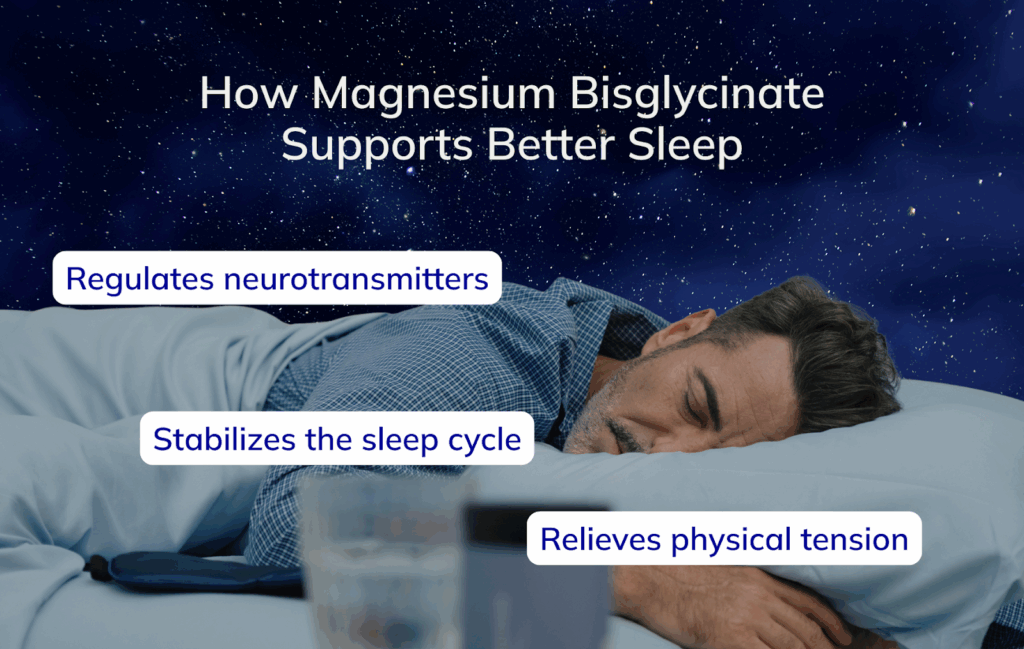What Is Magnesium, and why it matters for sleep
Magnesium is an essential mineral required for over 300 enzymatic reactions in the body. It plays a vital role in energy production, cardiovascular function, muscle contraction, neurotransmitter regulation, and bone health. Despite its importance, modern lifestyles – characterized by stress, caffeine consumption, alcohol, and processed foods – can challenge the body’s ability to maintain adequate magnesium levels.
In nature, magnesium almost always occurs in combination with other elements. And in supplements, it’s paired with various compounds which influence how well it’s absorbed and tolerated.
So what makes Magnesium Bisglycinate different from forms like citrate, oxide, or sulfate? Why do some forms support better sleep, while others are used for digestion or blood pressure management?
In this article, we explore the properties and applications of Magnesium Bisglycinate – an especially bioavailable and sleep-supportive form of magnesium.
In this article
What Is Magnesium Glycinate?
Magnesium glycinate does not occur naturally in foods. It is created by binding magnesium to glycine, a non-essential amino acid, in a process known as chelation. This bond significantly improves magnesium’s absorption in the body. While forms like magnesium oxide have a bioavailability of just around 4%, magnesium glycinate offers absorption rates up to 10–20 times higher. This is largely thanks to glycine, which helps transport magnesium more efficiently through the intestinal wall and into the bloodstream, making it more readily available for the body to use.
Magnesium Bisglycinate vs Magnesium Glycinate: what’s the difference?
Magnesium glycinate and magnesium bisglycinate refer to the same compound.
The term “bisglycinate” indicates that two glycine molecules are bound to one magnesium ion – a detail that often causes confusion in naming. Despite the variation in terminology, both refer to the same highly bioavailable and well-tolerated form of magnesium.
You may also encounter slight spelling differences depending on the source, such as “magnesium glycinate” or “magnesium bisglycinate”, which simply reflect language conventions rather than differences in the compound itself.
Why chelation matters, and the role of the blood-brain barrier
Chelated minerals are easier for the body to absorb because the attached amino acids act like transport vehicles. In the case of magnesium bisglycinate, glycine not only enhances absorption through the gut but also supports delivery across the blood-brain barrier. This allows magnesium to exert calming effects directly on the brain’s neurochemistry – where it can support better sleep, mood regulation, and resilience to stress.
How Magnesium Bisglycinate Supports Better Sleep

Magnesium bisglycinate promotes restorative sleep by acting on several interconnected biological pathways:
a. Regulates neurotransmitters
Magnesium increases GABA (gamma-aminobutyric acid) activity – the brain’s primary calming neurotransmitter. It also modulates NMDA receptors, reducing excitatory signals that contribute to overstimulation. Together, these effects help quiet the mind and body before bed.
b. Stabilizes the sleep cycle
By supporting GABA and glycine levels, magnesium bisglycinate helps you enter and maintain slow-wave sleep (deep sleep), the stage responsible for tissue repair, immune activation, and detoxification of the brain through the glymphatic system.
c. Relieves physical tension
Magnesium is vital for proper muscle function. It helps prevent nighttime cramps, twitching, or restlessness, making it easier to stay asleep and wake up feeling physically recovered.
Magnesium Bisglycinate and Muscle Cramps
Muscle cramps are often linked to electrolyte imbalances, particularly low magnesium. Magnesium bisglycinate, with its high absorption rate, has been shown to reduce the frequency and severity of nighttime leg cramps and muscular tension. Its calming glycine component further helps the body enter a parasympathetic, relaxed state.
Who Should Consider Magnesium Bisglycinate?
Magnesium bisglycinate isn’t just for those with diagnosed deficiencies. It may be especially beneficial if you:
- Struggle to fall or stay asleep
- Experience physical tension or cramping at night
- Deal with stress, anxiety, or racing thoughts before bed
- Wake up tired despite sleeping 7+ hours
- Are navigating perimenopause or menopause
- Train or exercise frequently
- Consume caffeine or alcohol regularly
When and How to Take It
Magnesium Bisglycinate is best taken in the evening, around 1–2 hours before bed. This allows time for:
- Nervous system relaxation
- Increased GABA signaling
- A gentle transition into deeper sleep stages
It may be paired with Vitamin B6, glycine, or adaptogenic herbs like saffron or holy basil to enhance its calming and mood-regulating effects. As with most nutrients, consistency matters: daily use provides the most sustained benefits.
What to Look For in a High-Quality Supplement
If your goal is better sleep and long-term well-being, choose a magnesium supplement which offers:
- Pure, fully chelated magnesium bisglycinate (not blended with oxide or citrate)
- High bioavailability with no laxative effect
- Clean-label ingredients with no fillers or artificial sweeteners
- Third-party testing for purity and stability
- Complementary ingredients like L-theanine, saffron extract, or B6
Introducing Sereniser: sleep support backed by Longevity Science
Sereniser is a non-sedative, melatonin-free sleep supplement developed in Switzerland to support full-spectrum sleep architecture. At its core is magnesium bisglycinate, combined with clinically studied compounds to promote calm, relaxation and natural, restorative sleep:
It combines:
- Magnesium Bisglycinate – A well-tolerated, highly bioavailable form of magnesium known to support neuromuscular relaxation and healthy nervous system function. Often used to ease tension, reduce nighttime restlessness, and promote deeper, more continuous sleep.
- Saffron Extract (Safr’Inside™) – Clinically studied for its role in modulating serotonin pathways, saffron supports emotional balance, pre-sleep mood, and the natural conversion of serotonin into melatonin, making it a powerful ally for sleep quality without sedation.
- L-Theanine & Holixer® (Holy Basil Extract) – This combination targets the body’s stress response system. L-Theanine promotes calming alpha brain wave activity, while Holixer® has been shown in clinical studies to reduce cortisol levels and improve resilience to psychological stress.
- Vitamin B6 – A coenzyme involved in the synthesis of GABA, serotonin, and melatonin. By supporting neurotransmitter balance, B6 plays a critical role in regulating sleep onset, mood stability, and circadian rhythm alignment.

Why is Sereniser melatonin-free?
Most sleep supplements rely on synthetic melatonin to trigger sleep, but this approach can interfere with the body’s natural circadian rhythm when used long-term. Sereniser takes a different path, instead of replacing your body’s melatonin, it supports its natural production and regulation. By targeting upstream pathways such as serotonin balance, cortisol regulation, and nervous system calm, Sereniser helps the body restore its own circadian rhythm – promoting deep, consistent rest without dependency or hormonal disruption.
At AVEA, all of our formulations are driven with purpose: every ingredient in Sereniser is selected to support the biological systems that govern real, restorative sleep – from circadian rhythm and neurotransmitter balance to stress response and deep sleep architecture.
Learn more about Melatonin myths here













